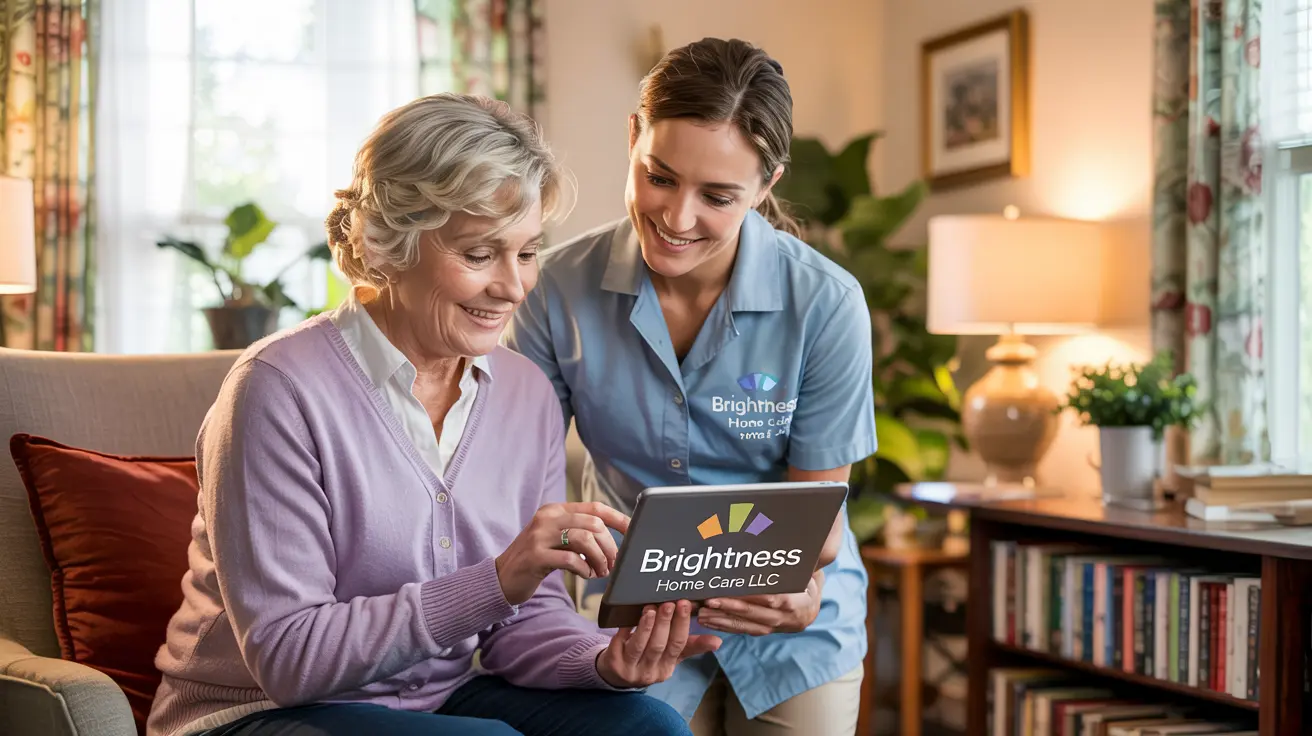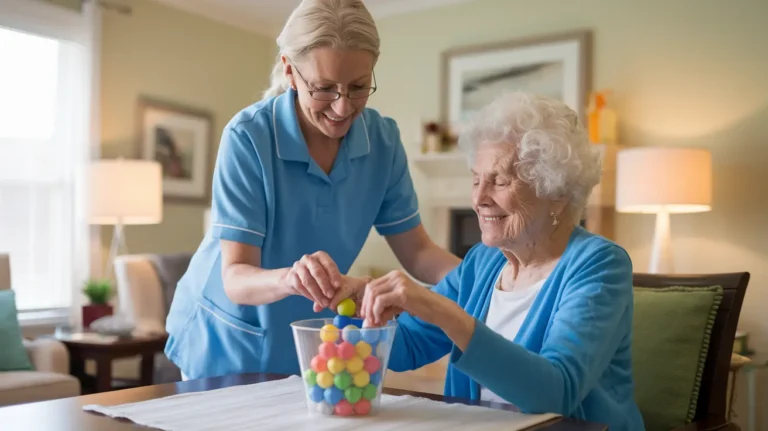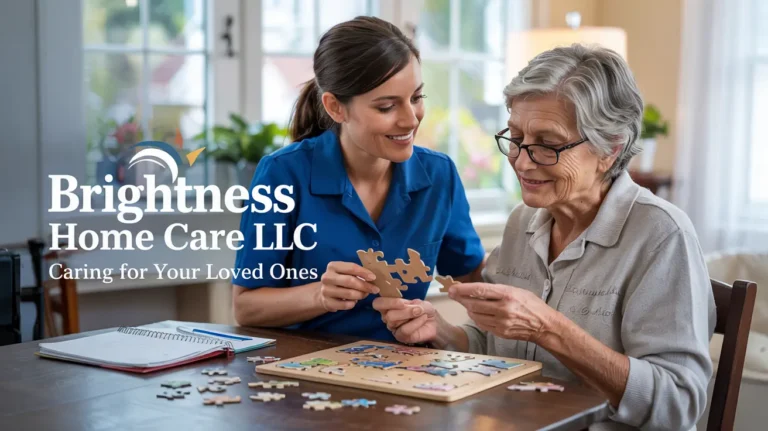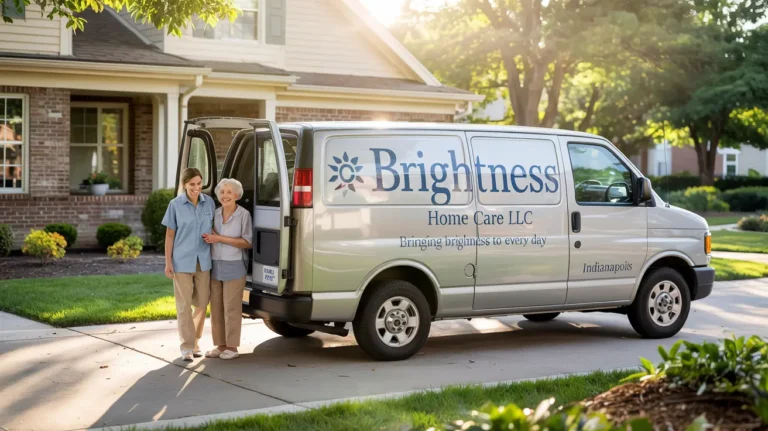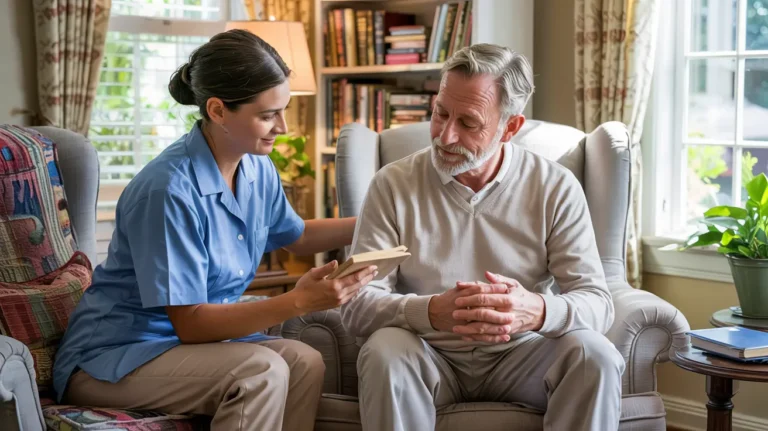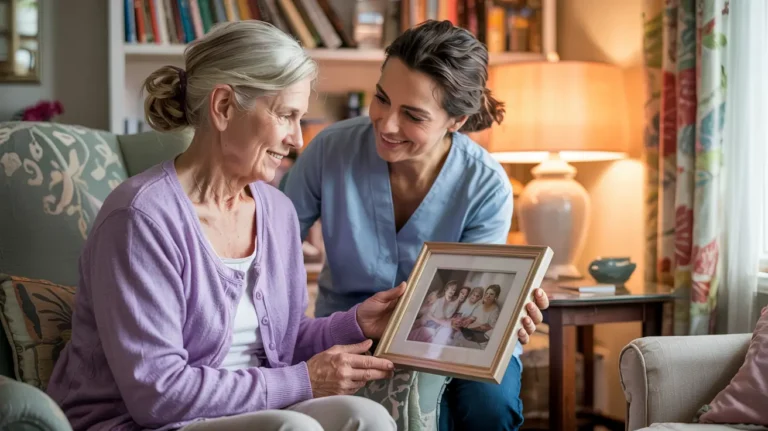Memory Care Technology: Innovative Solutions for Seniors in Indianapolis
Did you know that nearly 6 million Americans are currently living with Alzheimer’s disease, and someone develops the disease every 65 seconds? It’s a staggering reality that hit home for me when my own aunt was diagnosed several years ago. I remember feeling completely overwhelmed by the challenges of providing proper care while preserving her dignity and independence.
Technology has become a game-changer in the memory care field, and I’ve seen firsthand how the right tools can make an enormous difference! Indianapolis has emerged as a surprising hub for memory care innovation, with local providers implementing solutions that were unimaginable just a decade ago. Brightness Home Care LLC, located at 4911 West 38th street in Indianapolis, has been at the forefront of integrating these technologies into personalized care plans.
Honestly, navigating the world of memory care technology can feel like learning a foreign language at first. Trust me, I’ve been there – confused by terminology and unsure which solutions would actually help. That’s why I want to break down these options for families who are facing the same challenges I once did.
Understanding Modern Memory Care Technology
Memory care technology encompasses a wide range of devices, systems, and applications specifically designed to assist individuals with cognitive impairments. When I first started researching options for my aunt, I was amazed by how much was available – and completely overwhelmed by the choices!
The evolution has been pretty incredible to witness. Ten years ago, we were basically limited to basic emergency call buttons and simple reminder systems. Now? We’ve got AI-powered assistants, sophisticated monitoring systems, and interactive therapies that actually engage seniors with memory issues. I remember installing my aunt’s first medication reminder device – a clunky thing that looked like it belonged in a hospital. Compare that to today’s sleek, intuitive systems that blend seamlessly into the home!
These technologies support people with various cognitive conditions – not just Alzheimer’s but also vascular dementia, Lewy body dementia, frontotemporal disorders, and even mild cognitive impairment. Each condition presents unique challenges, and I’ve learned that matching the right technology to the specific symptoms makes all the difference.
The real magic of these solutions is how they enhance independence while maintaining safety. My aunt absolutely hated feeling like she needed supervision, and these technologies allowed her to maintain her sense of autonomy. She could move freely around her home while we had the peace of mind knowing she was protected. The motion sensors we installed were discrete enough that she barely noticed them, but they gave us immediate alerts if anything seemed off.
The emotional impact is something I don’t think gets talked about enough. For seniors, these technologies can reduce the frustration and anxiety that comes with memory issues. I’ll never forget the look on my aunt’s face when she successfully managed her medications independently for a week using her new dispenser system. For caregivers like me, the reduction in stress is immeasurable. Being able to check in remotely meant I could actually sleep through the night without constant worry!
Smart Home Adaptations for Memory Care Patients
Voice-activated systems have been absolute game-changers for memory care! I installed Amazon Echo devices throughout my aunt’s home, and it was amazing how quickly she adapted to them. Even when she struggled to remember how to operate the TV remote, she could simply ask Alexa to play her favorite shows. These systems eliminate the need to remember complex sequences of buttons or commands, which can be incredibly frustrating for someone with memory issues.
Automated medication dispensers are another must-have, and boy, do I wish we’d gotten one sooner! Before implementing one, we had several scary incidents with missed or double doses. The modern dispensers not only organize medications but provide audible and visual alerts, lock away extra pills to prevent overdosing, and even send notifications to caregivers if medications aren’t taken. The peace of mind is seriously worth every penny!
Motion sensors and activity monitoring systems helped us identify patterns we wouldn’t have noticed otherwise. We discovered my aunt was often wandering at night, which explained her daytime fatigue. The system sent alerts to my phone whenever unusual activity was detected, allowing me to check in via video call to make sure everything was okay. Some nights I’d see her wandering to the kitchen repeatedly, and we realized she was forgetting she’d already had her evening snack.
Smart lighting has been surprisingly effective in reducing sundowning effects – that increased confusion and agitation that often happens in the late afternoon and evening. We programmed the lights to gradually brighten in the morning and slowly dim in the evening, which helped maintain her circadian rhythm. The lights also automatically illuminated hallways and bathrooms when motion was detected at night, preventing falls during those middle-of-the-night trips to the bathroom.
Specialized security systems designed for memory care go beyond standard home security. Door sensors alerted us whenever exterior doors opened, which was crucial for preventing wandering. The system we installed through Brightness Home Care LLC even included customizable voice prompts that would remind my aunt to stay inside when she approached an exit after certain hours.
Integration with existing home setups is usually simpler than people expect! When I first considered these technologies, I worried we’d need to completely renovate my aunt’s beloved home. In reality, most systems are designed to be installed with minimal disruption, often using wireless technology that doesn’t require tearing into walls. The team from Brightness Home Care walked me through the whole process and handled the installation with remarkable sensitivity.
Digital Therapeutic Solutions for Cognitive Health
Cognitive stimulation applications have become a daily part of many memory care routines, and I’ve seen remarkable results! These apps offer exercises designed specifically for seniors with memory issues, targeting different cognitive functions like attention, problem-solving, and recall. My aunt particularly enjoyed an app called Lumosity, and I noticed she seemed sharper on days when she used it regularly. The key is finding applications that are enjoyable rather than frustrating – otherwise, they just collect digital dust!
Virtual reality therapy was something I was totally skeptical about at first. I mean, could you imagine my 83-year-old aunt wearing a VR headset? But when we tried it through a program offered by Brightness Home Care LLC, I was blown away by her reaction! The immersive environments triggered old memories and sparked conversations about places she’d visited decades ago. Some VR programs even recreate familiar environments from the past, which can provide incredible comfort to someone whose short-term memory is failing while long-term memories remain intact.
Brain training games designed specifically for seniors offer the perfect balance of challenge and achievability. The best ones adapt to the user’s abilities, becoming easier or more difficult based on performance. This prevents the frustration that can come with games that are too challenging, which I learned the hard way after downloading some inappropriate apps that just left my aunt feeling defeated. Look for games that provide positive reinforcement and celebrate small victories – the emotional boost is just as important as the cognitive exercise!
Remote monitoring capabilities give caregivers incredible peace of mind. I can’t tell you how many meetings I stepped out of to answer calls from my aunt before we implemented digital solutions. Once we had a system in place, I could discreetly check an app on my phone to see if she was active, if she’d taken her medications, and even if she’d eaten lunch. This not only reduced my anxiety but actually improved our relationship – our conversations could focus on enjoyable topics rather than me constantly checking if she’d completed basic tasks.
The effectiveness of digital interventions is backed by growing research, though finding the right match for each individual takes some trial and error. Some digital therapies have shown promising results in slowing cognitive decline, particularly when combined with medication and other treatments. I’ve found that the most successful approach is integrating these digital solutions into a broader care plan rather than relying on them exclusively.
Wearable Technology for Memory Care Patients
GPS tracking devices have literally saved lives, and I’ve experienced this firsthand! My aunt wandered away from home one afternoon while I was picking up groceries, and I was absolutely terrified. Thanks to the discreet GPS tracker in her watch, I located her within minutes at a park where we used to feed ducks together. Many modern tracking devices are designed as stylish watches, pendants, or shoe inserts that seniors don’t mind wearing. Brightness Home Care LLC helped us select one that matched my aunt’s style preferences while providing the safety features we needed.
Health monitoring wearables adapted for seniors go beyond the fitness trackers younger folks use. These specialized devices monitor vital signs, sleep patterns, and activity levels with interfaces designed for older users. Some even detect subtle changes that might indicate an emerging health issue before obvious symptoms appear. I noticed my aunt’s device showed decreased activity and disrupted sleep patterns several days before she developed symptoms of a UTI – a common but serious condition for seniors with dementia that often presents atypically.
Fall detection technology provides an essential safety net, especially for seniors living with cognitive impairments who might not remember or be able to press a call button after a fall. The wearable we chose automatically detected falls and alerted both emergency services and family members, providing location data and even some health metrics. It gave us enough confidence to support my aunt’s desire to continue her daily walks around her familiar neighborhood, maintaining her independence a little longer.
Emergency response integration means these devices don’t just detect problems – they actively connect to help. The best systems automatically contact emergency services, family members, and care providers in a hierarchical order that makes sense for each situation. The system we used through Brightness Home Care LLC even provided emergency responders with essential medical information and directions to her exact location, saving precious minutes in an emergency.
Comfort and compliance considerations are super important – the best technology in the world is useless if the senior won’t wear it! I learned this lesson when my aunt repeatedly “lost” her first medical alert pendant because it made her feel “old and sick.” We switched to a stylish watch that looked like regular jewelry, and suddenly compliance wasn’t an issue anymore. Brightness Home Care LLC showed us several options and let my aunt choose the one she liked best, which gave her a sense of control in the process.
How Brightness Home Care LLC Implements Memory Care Technology
The assessment process for technology needs through Brightness Home Care LLC was surprisingly thorough. I expected a quick checklist, but instead, they spent time observing my aunt in her home environment, noting her specific challenges and preferences. They evaluated her cognitive abilities, physical limitations, daily routines, and even her technology comfort level. This comprehensive approach meant the solutions they recommended actually addressed our specific needs rather than just pushing whatever new gadget was available.
Customization of solutions is where Brightness Home Care LLC really shines! They didn’t just offer a one-size-fits-all package of memory care technology. Instead, they created a personalized system that addressed my aunt’s specific challenges. For instance, they noticed she struggled particularly with evening routines, so they programmed automated reminders and smart home features that provided extra support during those vulnerable hours. The medication management system was customized with her specific schedule, including photos of each pill to reduce confusion.
The training they provided was practical and patient-centered. Let’s be real – learning new technology can be frustrating at any age! The Brightness team scheduled multiple short sessions rather than one overwhelming training, allowing my aunt to absorb information at her own pace. They created simple, illustrated guides that we kept near each device and checked in regularly to address questions. They even trained me separately so I could provide reinforcement between their visits.
Ongoing support and maintenance is something I didn’t initially consider but came to value enormously. Technology inevitably has glitches, and when you’re dealing with memory care, immediate resolution is crucial. Brightness Home Care LLC provided 24/7 technical support, regularly scheduled maintenance checks, and prompt responses to any issues. When our smart home hub needed a software update that changed some features, they arrived the same day to adjust settings and retrain us on the new interface.
The success stories from Indianapolis families were what initially drew me to Brightness Home Care LLC. During our consultation, they shared several anonymous case studies that mirrored our situation. One that particularly gave me hope involved a gentleman with mid-stage Alzheimer’s who was able to remain in his home for an additional three years thanks to their integrated technology solutions. Hearing these stories helped me envision a positive path forward during a very uncertain time.
Their coordination with medical providers streamlined our overall care plan. With our permission, Brightness Home Care LLC communicated directly with my aunt’s neurologist and primary care physician, ensuring that the technology solutions aligned with her medical treatment plan. They were able to provide valuable data from the monitoring systems to her doctors, who used this information to adjust medications and interventions based on objective information rather than my anecdotal reports during brief appointments.
Choosing the Right Memory Care Technology Provider in Indianapolis
When evaluating providers, I wish I’d known what questions to ask from the start! Based on my experience, here are the essentials: What specific training do your staff members have in both technology and memory disorders? What’s your response time when issues arise? How do you stay current with new technological developments? Do you offer trial periods for equipment? What happens if my loved one’s condition changes and different solutions are needed? Brightness Home Care LLC answered all these questions without hesitation and provided references from families they’d served.
Important certifications and training aren’t just fancy papers on the wall – they directly impact the quality of service. Look for providers whose staff have specialized training in dementia care like CARES Dementia Specialist certification, as well as technical certifications relevant to the systems they install and maintain. Brightness Home Care LLC employs team members with nursing backgrounds alongside those with technical expertise, creating a well-rounded approach to memory care technology implementation.
Cost considerations can be complicated, and I was initially shocked by some of the price tags! However, when compared to the cost of full-time in-person care or memory care facilities, these technology solutions often represent significant savings. Some Medicare Advantage plans cover certain memory care technologies, and long-term care insurance may provide reimbursement. Brightness Home Care LLC helped us navigate these options and develop a phased implementation plan that spread costs over time while addressing the most critical needs first.
The advantage of working with local providers like Brightness Home Care LLC became evident the first time we needed immediate assistance. When my aunt accidentally unplugged her smart home hub, a technician was at her home within hours to restore the system and patiently explain (again) which cords needed to remain connected. National companies simply can’t provide that level of responsive service. Plus, local providers understand the specific resources and services available in Indianapolis, allowing for more integrated care planning.
Integration with other care services is essential for creating a comprehensive support system. Brightness Home Care LLC coordinates seamlessly with home health providers, meal delivery services, transportation programs, and other community resources that support aging in place. This holistic approach ensures that technology solutions complement rather than compete with human care, creating a safety net that addresses all aspects of daily living for seniors with memory issues.
Future Trends in Memory Care Technology
Emerging AI solutions for cognitive support are developing rapidly, and I’m genuinely excited about their potential! Adaptive AI systems are being designed that can learn an individual’s patterns and preferences, providing increasingly personalized support as they gather data. These systems can detect subtle changes that might indicate health problems or cognitive decline, allowing for earlier intervention. Some are even being designed to adjust their communication style based on the senior’s cognitive status that day – speaking more slowly or repeating information when needed.
Advances in predictive care technology could transform how we approach memory disorders. Rather than simply reacting to problems as they occur, these systems aim to prevent issues before they happen. For example, monitoring systems are being developed that can detect changes in gait or sleep patterns that often precede falls by days or weeks, allowing for preventive measures. Brightness Home Care LLC is already implementing some early versions of these predictive technologies, placing them at the cutting edge of memory care in Indianapolis.
Integration of telehealth with memory care has accelerated dramatically, and I’m grateful for this development! My aunt used to become extremely agitated by trips to the doctor’s office, which often triggered days of increased confusion. With telehealth integration, her vital signs and activity data are continuously shared with her healthcare providers, and many routine check-ups are conducted via video conference in the familiar environment of her home. This reduces stress while actually providing her medical team with more comprehensive information than they’d get during a brief office visit.
The development of more intuitive interfaces specifically designed for seniors with cognitive impairments represents a major breakthrough. Traditional technology often requires remembering passwords, navigating complex menus, or following multi-step processes – all significant barriers for someone with memory issues. The newest interfaces use facial recognition, voice commands, and single-touch systems designed with cognitive limitations in mind. I’ve watched my aunt successfully use systems that she would have found impossible to navigate just a few years ago.
Indianapolis is surprisingly well-positioned in the future of memory care, with several healthcare systems and technology companies collaborating on innovative solutions. Brightness Home Care LLC participates in pilot programs testing emerging technologies, which means their clients often benefit from cutting-edge solutions before they’re widely available. The city’s relatively lower cost of living compared to coastal tech hubs has also attracted startups focusing on aging and memory care, creating a dynamic ecosystem of innovation that directly benefits local seniors.
Conclusion
Looking back at how memory care technology has transformed my aunt’s life and my experience as her caregiver, I can’t emphasize enough how important these innovations have become. From preventing wandering incidents to stimulating cognitive function and enabling greater independence, these technologies address challenges I once thought were insurmountable.
The key takeaway I’ve learned is that implementation must be personalized – what works brilliantly for one senior might be completely ineffective for another. Brightness Home Care LLC’s approach of thorough assessment and customized solutions exemplifies how technology should be integrated into memory care.
If you’re caring for a loved one with memory issues in Indianapolis, I strongly encourage you to explore how these technologies might improve both their quality of life and your peace of mind. Brightness Home Care LLC at 4911 West 38th street offers free initial consultations to discuss your specific situation and needs.
Remember, technology isn’t meant to replace human care and connection – it’s designed to enhance it by handling routine monitoring and tasks, freeing family members to focus on meaningful interaction rather than constant supervision. I’d love to hear about your experiences with memory care technology in the comments! What solutions have worked for your family? What challenges are you still facing?

